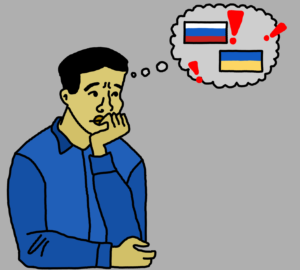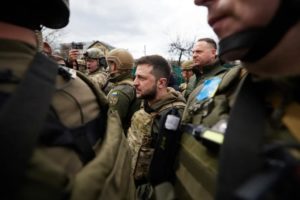Normalized nuclear threats show us the path to peace
April 3, 2023
It seemed somewhat unimaginable until the pandemic to see a war play out with a global power involved, yet the time finally came when after years of speculation, Russia invaded Ukraine. However, even with the start of a war, it should be that with NATO’s power and the U.S.’s economic hegemony, Russia would finally gain an incentive to stop their attacks. Instead, it’s 2023, and even the biggest bunches of sanctions haven’t slowed down the pace of a war that almost all of us watch from our seats.
Looking even deeper, however, the past year has included several nuclear risks as well. Nuclear risk has increased in North Korea, Iran and Eastern Europe. More importantly, with the escalating news that has flooded media for the past year, these threats seem to be normalized. This has left the public, including us high schoolers, to become numb to the near-constant threat of a nuclear war. But it’s left governments, especially the U.S.’s, to contemplate the possibility of nuclear war emerging every day.
The last time where people saw nuclear tensions truly this high was arguably during the Cold War; the height of an ideological battle and proxy wars offered an opportunity for tension to escalate into nuclear devastation. It was also an especially scary time due to the rapidly developing arsenals of the United States and the Soviet Union, as they built more and more nukes and warheads ready for launch. President Kennedy estimated at that time that the chances of a nuclear weapon being used during the Cuban Missile Crisis as “somewhere between one out of three and even.”
Yes, it is threatening if any country would want to use weapons of mass destruction and annihilate the world around them. But in reality, the risks came closer to reality than most realize. In 1983, it was the policy of the Soviet Union to launch full nuclear retaliation in response to American strikes with no hesitation. During this time period, one man, Stanislav Petrov, stopped a full-blown nuclear war from accidentally occuring. A false alarm rang out on a Russian missile detection system, inaccurately detecting five U.S.-launched ICBMS heading towards the USSR. Petrov decided to not report the detection, preventing what would have been a Soviet retaliatory assault that would have killed an estimated 35 to 77% of the U.S. population. His rationality was key to preventing escalation at that time, but in this status quo of polarization and high levels of “othering,” is it easy to say that this rationality has increased?
To me, it seems as if we are all trapped in this mix of complacency and awareness. A good example of this is the Russia-Ukraine war. On one hand, there’s no reason to expect Russia to escalate to nuclear war in the Ukraine conflict unless absolutely necessary, as its usage is not only against the ideals of mutually assured destruction but against their own military policy as well.
Paul Ingram, a British nuclear disarmament expert and researcher for the Center for the Study of Existential Risk, holds similar views. “It’s like boiling a frog in water,” he explains. “We could keep heating the water up and it is perfectly possible that the frog will remain in the water and be boiled alive, which is not very pleasant for the frog. But the frog could jump out at any moment, and that would be really bad for everybody.”
That increase in temperature has come from the U.S. in the form of leverage, specifically sanctions, against Russia. They were intended to stop escalation in the war and reduce the risk of their nuclear weapons. However, the start of the second year of the war shows something surprising: Russia’s economy is surviving well (relatively). They’ve kept their hold on oil, they’ve reduced the impact of the continuous sanctions being placed, and they still have stable communication with other countries. If threats and leverage haven’t worked, then it’s time to look towards a new path.
The biggest global disasters have ultimately come from the lack of communication, like the war occuring right now or the Iraq War decades ago. It’s a pattern that the U.S. has always followed, but not a strategy that leads to long-term success.
“Ideally, [discussions and cooperation] are an exchange of views that is not about finger pointing and it’s not about position-taking ideally,” Ingram said. “It’s about common exploration of the different concerns and perspectives.”
It makes sense that nuclear threats have been normalized. When so many powers feel pressured to keep their arsenals up-to-date, when nations become embroiled in arms races with global opponents on the other side of the world, and when so many powers feel as if they are being isolated by some in the international stage of diplomacy, there is no incentive to cooperate. How can one expect to cooperate with an enemy when they are labeled as an enemy in the first place? The West hoped to lead a coalition against Russia and isolate them, but instead, we’ve seen the splintering of global views and positions. That isn’t to say that Russia doesn’t deserve the condemnation, but that condemnation isn’t the only approach worth taking.
I’m aware that there’s always a risk of those nuclear threats being realized, which could justify greater aggression. As Ingram said, “Every moment is a moment of opportunity as well as a moment of risk.” But there’s no point in purely destructive thinking. In the 1980s, most wouldn’t have thought that the Cold War could end on a positive note, and yet the end of the Cold War ushered in a new age of arms control agreements and (short-lived) global cooperation. Ultimately, these things can be “beyond our imagination,” and there’s no point in ruling those hopes out.
And that’s the lesson that these normalized nuclear threats and normalized armed aggression teaches us. There’s always a chance of something bad occurring, but the way to avoid those problems isn’t through unrestrained aggression. It should come from the idea of cooperation and collaboration, an idea we’re all taught as children, but feels like a radical idea in this current mess of political polarization. It would definitely be a radical shift in the status quo of foreign policy.
“I have no hesitation in sitting down with Russians, with Iranians, and with the Chinese and talking about the way in which the British have driven such dysfunctional systems around the world in the past and continue to do so,” Ingram says when reflecting on his actions as a diplomat and participant in the world of foreign policy. “We need to have a greater degree of humility and understanding… so that we can let go of the divisional thinking and understanding and have greater compassion. That’s the way we build peace and I’m hopeful that that is possible in my interactions with officials.”
No matter how unlikely the threat, education about this topic in schools is key. Jeffrey Vangene, a history teacher at DVHS, emphasized the importance of teaching about nuclear weapons and threats in the classroom in order to learn from the past:
“You should never run from history,” he said. “Whether it’s going to be [talking about] nuclear bombs or how the United States is most definitely responsible for pushing some of the worldwide weapons development during [the 20th century] and still today, it’s something that needs to be taught because you need to know who and which countries control these weapons and how they use the weapons.”
Ultimately, whether we are future policymakers or high school overthinkers, we can sit by quietly with closed minds. Listening and connecting can solve issues in the world, like global nuclear threats and everyday end-of-the-world scenarios, and it can definitely be the solution to the issues we all face on our own. It’s a big ask, but if a shift from “othering” and divisions occurs, it could truly be, on all the levels of life we encounter, the key to peace.





